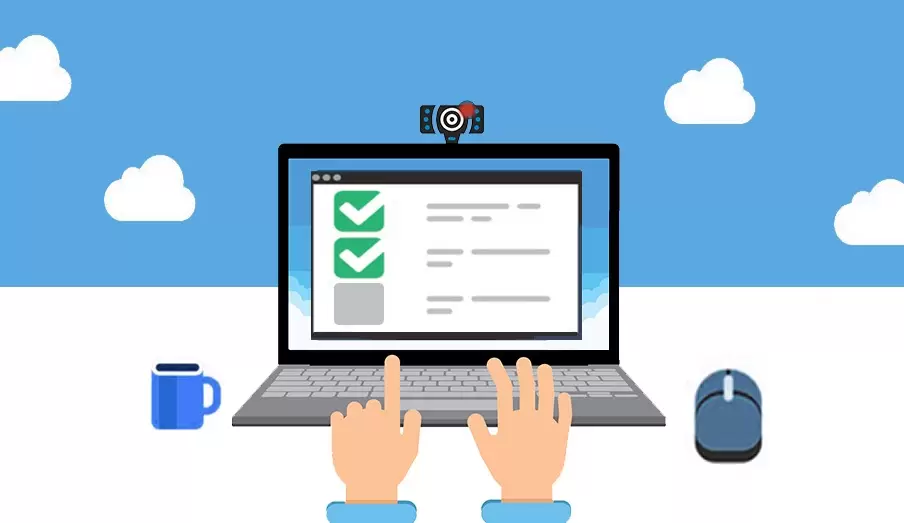
While Zoom and other video conferencing software have come to the rescue for students and teachers, conducting online tests is not easy. Many open source online exam software providers in India are available who can provide solutions that is quick to implement. However, the best online exam software must address challenges of remote proctoring to ensure fair testing.
TL;DR
Top 3 Techniques to ensure online exams are secure
- Securing student browsers during an online test
- Remote proctoring and student authentication
- Data encryption to prevent unauthorized tampering
1. Secured Browsers
The biggest apprehension whether it is a high-stake examination or a class test is to have a hassle-free exam environment that has a low risk of unfair practices aka cheating. One of the ways to maintain the integrity of testing is by securing the browser. This essentially means that when a student starts an online test, their browser gets locked i.e. all other browser windows and tabs get deactivated till the student submits the test. It also prevents other applications like screen capture or recording software from running in the background.
Web-based lockdown browsers can convert any remote system into a safe workstation. It restricts a student’s ability to access any online sources thereby making examinations, whether it is a class of 50 or thousands, exceptionally secure and reliable.
Also read: Online examination software case study
2. Proper Authentication
The biggest challenge that educational institutions have with online tests is that it brings new ways of tricking the system
- Impersonation i.e. someone else taking the test for the candidate
- Students taking an ‘open book” exam even though the exam is not meant as one
- Students getting verbal help from someone in the background or using smart phones for digital help.
An online exam management system should be flexible enough to give your educational institution different levels of security as needed.
Impersonation is a comparatively easy solution that any online exam software should be able to prevent. Candidate identity verification through showing an ID to the camera at the start of the exam is the simplest kind of authentication.
More reliable authentication methods involve continuous monitoring. One way is that online webcams with audio enabled is made a requisite of the online test. This can capture most malpractices. However, online manual proctoring, is just not feasible unless it is automated. Most high stakes online exams that are not conducted at physical examination centres use Artificial Intelligence to detect malpractice.
Remote proctoring options are many
Video Proctoring: This requires a reliable broadband internet connection since monitoring happens with continuous video streaming. The assessment controller can analyse behaviour from the video. As said, this is best for tests administered to small class size of 30 to 40 students.
Image Proctoring: This mode of remote proctoring is best for unreliable internet connectivity and captures the examinee’s image multiple times. This could be at the start and end of the exam, every 45 seconds (whatever time limit is set) etc. Machine learning algorithms or manual vigilance (less dependable) can be used to detect any malpractice. It is more cost-effective of all the options.
Auto Proctoring: This is best for large scale examinations and can monitor and analyse simultaneously, to instantly identify any suspicious activity. In this format of remote invigilation, the human proctor is replaced by algorithm models that run incoming data against different models and can flag suspicious behaviour. Machine Learning enabled proctoring systems increase the accuracy of fraudulent behaviour detection because they can identify details like whispers, reflections, shadows and gestures and eye movements that do not match with ‘normal’ patterns of behaviour.
Also Read: 4 Strategies to Improve Communication with Students/Parents Using Edumate’s ERP
3. Data Encryption
Platforms like iTech’s Edonline are cloud-based applications which cuts down on operating costs. Cloud hosting also provides for data encryption of data to prevent any misuse. To prevent any fraudulent access, question banks, student results and other personal information is stored in a highly secure and encrypted manner. The communication between the examination server and the examinee’s system is also encrypted so that data cannot be hacked.
Encryption is an important feature of the best online exam software that follow open source standards. Decoded data is only made available to those with proper authentication and different access levels.
While most schools in higher grades may have standardized requirements for online examinations, this is not true for lower grades where different kinds of questions and grading models are followed. The same goes for colleges that might have their own examination methodology. Unfortunately, many of the exam systems are off -the- shelf. iTech’s EdOnline is a software as a service SAAS solution that allows for the flexibility of integrating with the available systems.
Contact our team through a message here, we would be glad to arrange an online exam demo for you.


